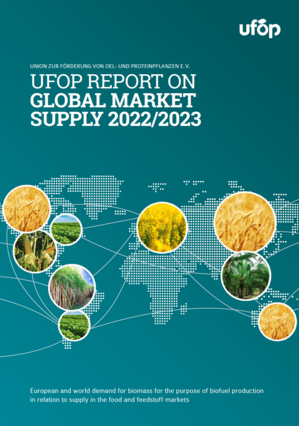UFOP publishes updated Report on Global Market Supply 2022/2023
UFOP: food-or-fuel debate leads to a dead end – hampering technological progress aimed at securing food production is ethically unacceptable
Berlin, 30 January 2023. The updated issue of the Report on Global Market Supply published by the Union for the Promotion of Oil and Protein Crops (Union zur Förderung von Oel- und Proteinpflanzen e.V. UFOP) once again confirms that in purely arithmetic terms food supply per capita is sufficient to feed the world's population. Nevertheless, more than 800 million people are starving or suffering under malnutrition. The report finds that the causes primarily lie in extreme natural events, inadequate state leadership, corruption and forced migration, along with the implications of climate change, which is exacerbating the problems in some regions, such as the Horn of Africa.
 Just how suddenly existing supply chains that are vital for regional supply can break down has been shown in Russia's war of aggression against Ukraine. Actions taken by governments and economies aimed at safeguarding supply to the affected states in North Africa as quickly as possible. The fundamental issue of how to provide immediate physical food aid in globally increasing emergencies remains. Germany acknowledges its responsibility. The German government points to the comprehensive financial support it has provided while at the same time calling for further aid.
Just how suddenly existing supply chains that are vital for regional supply can break down has been shown in Russia's war of aggression against Ukraine. Actions taken by governments and economies aimed at safeguarding supply to the affected states in North Africa as quickly as possible. The fundamental issue of how to provide immediate physical food aid in globally increasing emergencies remains. Germany acknowledges its responsibility. The German government points to the comprehensive financial support it has provided while at the same time calling for further aid.
However, money is not the only means needed to secure food. The physical availability of agricultural feedstock is also a necessary requirement. The generation of such feedstock always starts in agriculture, in the field, no matter where in the world or what the final use. The UFOP underlines that feedstocks for use in biofuels production are physically available for food uses and, in this sense, "buffer" available supply – contrary to politically promoted extensification and reduction of per hectare yields. The association urges that industrial countries should provide more support for actions to promote self-sufficiency in production, harvest, storage and processing not only in countries affected by hunger and malnutrition. In fact, conditions needed for sustained growth in yields in changing climate conditions should be created in all production regions worldwide. The strategy of choice should be sustained and locally adapted intensification.
In view of the fast pace of climate change, technological progress in breeding and cultivation should be generated and utilised in a proper and responsible manner by applying new breeding technologies. The UFOP holds that it is ethically unacceptable if politicians from industrial countries oppose technical progress and consequently potential increases in yield for ideological reasons. The current EU agricultural policy aims at extensification, which leads to indirect changes in land use. At the same time, Berlin and Brussels complain about the food and supply crisis. According to the UFOP, the policies could not be more contradictory.
In more than 50 pages, the UFOP Report on Global Market Supply provides detailed information on the current state of global grain, oilseed and vegetable oil production, main uses in human and animal nutrition and use as a renewables feedstock in biofuels production.
The report is available to download at:
https://www.ufop.de/index.php/download_file/12108/
All Charts are available as press infographic: Link


 Union zur Förderung von Oel- und Proteinpflanzen E.V.
Union zur Förderung von Oel- und Proteinpflanzen E.V.